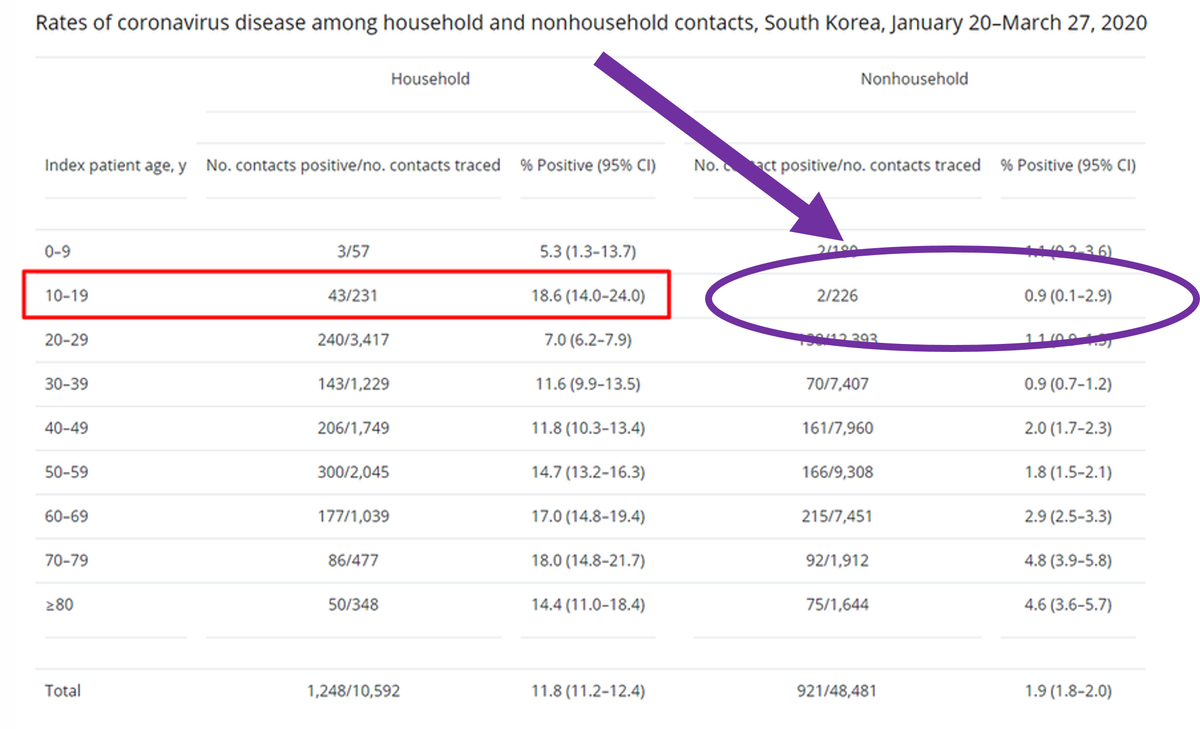1/ Prior to this weekend we had great news on 2 of 3 impt questions on kids:
 https://abs.twimg.com/emoji/v2/... draggable="false" alt="✅" title="Fettes weißes Häkchen" aria-label="Emoji: Fettes weißes Häkchen">Less likely to get it
https://abs.twimg.com/emoji/v2/... draggable="false" alt="✅" title="Fettes weißes Häkchen" aria-label="Emoji: Fettes weißes Häkchen">Less likely to get it
 https://abs.twimg.com/emoji/v2/... draggable="false" alt="✅" title="Fettes weißes Häkchen" aria-label="Emoji: Fettes weißes Häkchen">Less likely to die if they got it
https://abs.twimg.com/emoji/v2/... draggable="false" alt="✅" title="Fettes weißes Häkchen" aria-label="Emoji: Fettes weißes Häkchen">Less likely to die if they got it
 https://abs.twimg.com/emoji/v2/... draggable="false" alt="❓" title="Rotes Fragezeichen-Symbol" aria-label="Emoji: Rotes Fragezeichen-Symbol">Less likely to transmit
https://abs.twimg.com/emoji/v2/... draggable="false" alt="❓" title="Rotes Fragezeichen-Symbol" aria-label="Emoji: Rotes Fragezeichen-Symbol">Less likely to transmit
On #3: a new study found that kids 0-9 yrs old were 2-3x less likely to transmit as adults.
On #3: a new study found that kids 0-9 yrs old were 2-3x less likely to transmit as adults.
2/ There& #39;s more good news. Headlines from the weekend claimed the study showed that "older kids transmit just as much as adults", but that is being called into question... https://twitter.com/apsmunro/status/1284794506265722881">https://twitter.com/apsmunro/...
3/ When you look at the *full* dataset, you see that the & #39;18%& #39; that was driving headlines is totally incongruent with the rest of the data. Should have been a giant yellow caution flag. It was for me  https://abs.twimg.com/emoji/v2/... draggable="false" alt="👇" title="Rückhand Zeigefinger nach unten" aria-label="Emoji: Rückhand Zeigefinger nach unten"> https://twitter.com/j_g_allen/status/1284786290752475141">https://twitter.com/j_g_allen...
https://abs.twimg.com/emoji/v2/... draggable="false" alt="👇" title="Rückhand Zeigefinger nach unten" aria-label="Emoji: Rückhand Zeigefinger nach unten"> https://twitter.com/j_g_allen/status/1284786290752475141">https://twitter.com/j_g_allen...
4/ There& #39;s more. When you look at the methodology closely, as @apsmunro did in this thread, you see that the conclusion that older kids transmit the same as adults is problematic. https://twitter.com/apsmunro/status/1284794524544446466">https://twitter.com/apsmunro/...
5/ If you look at the full data set, including the right hand side of the table, which wasn& #39;t covered, it shows that 10-19 year olds are very similar to 0-9 year olds.
6/ As happens, the first, but erroneous, headlines, got millions of impressions, grounding the public& #39;s perception.
These nuanced follow-ons? Maybe a few dozen & #39;likes& #39;
These nuanced follow-ons? Maybe a few dozen & #39;likes& #39;
7/ There was a great quote in an article on this over the weekend by Jeffery Shaman: “People, depending on their ideology on school opening, are choosing which evidence to present — and that needs to be avoided,”
It& #39;s no wonder so many latched on to that 18% number.
It& #39;s no wonder so many latched on to that 18% number.
8/ Imagine a headline from this weekend that said:
"New study suggests kids 0-9 are 2-3x less likely to transmit than adults; data for older kids inconclusive at this time"
We have a massive responsibility in communicating science cleanly.
"New study suggests kids 0-9 are 2-3x less likely to transmit than adults; data for older kids inconclusive at this time"
We have a massive responsibility in communicating science cleanly.
9/ This study needs to be evaluated in the larger context of data about kids (and adults), when it& #39;s entered into the schools conversation.
--> kids less likely to get it
--> kids less likely to die from it
--> looks like they are less likely to transmit, but still open
--> kids less likely to get it
--> kids less likely to die from it
--> looks like they are less likely to transmit, but still open
10/ School closures come with devastating costs. Re-opening is an urgent national priority.
Want to reopen?
--> control community spread
--> apply strict risk reduction measures https://abs.twimg.com/emoji/v2/... draggable="false" alt="👇" title="Rückhand Zeigefinger nach unten" aria-label="Emoji: Rückhand Zeigefinger nach unten"> https://schools.forhealth.org/risk-reduction-strategies-for-reopening-schools/">https://schools.forhealth.org/risk-redu...
https://abs.twimg.com/emoji/v2/... draggable="false" alt="👇" title="Rückhand Zeigefinger nach unten" aria-label="Emoji: Rückhand Zeigefinger nach unten"> https://schools.forhealth.org/risk-reduction-strategies-for-reopening-schools/">https://schools.forhealth.org/risk-redu...
Want to reopen?
--> control community spread
--> apply strict risk reduction measures

 Read on Twitter
Read on Twitter


